
The Hollywood Revue of 1929, or simply The Hollywood Revue, is a 1929 American pre-Code musical comedy film released by Metro-Goldwyn-Mayer. It was the studio's second feature-length musical, and one of their earliest sound films. Produced by Harry Rapf and Irving Thalberg and directed by Charles Reisner, it features nearly all of MGM's stars in a two-hour revue that includes three segments in Technicolor. The masters of ceremonies are Conrad Nagel and Jack Benny.

Film Booking Offices of America (FBO), registered as FBO Pictures Corp., was an American film studio of the silent era, a midsize producer and distributor of mostly low-budget films. The business began in 1918 as Robertson-Cole, an Anglo-American import-export company. Robertson-Cole began distributing films in the United States that December and opened a Los Angeles production facility in 1920. Late that year, R-C entered into a working relationship with East Coast financier Joseph P. Kennedy. A business reorganization in 1922 led to its assumption of the FBO name, first for all its distribution operations and ultimately for its own productions as well. Through Kennedy, the studio contracted with Western leading man Fred Thomson, who grew by 1925 into one of Hollywood's most popular stars. Thomson was just one of several silent screen cowboys with whom FBO became identified.
Chasing Rainbows is a 1930 American Pre-Code romantic musical film directed by Charles Reisner, and released by Metro-Goldwyn-Mayer.

Gustav von Seyffertitz was a German film actor and director. He settled in the United States. He was born in Haimhausen, Bavaria, and died in Los Angeles, California, aged 81.

Good and Naughty is a 1926 American silent romantic comedy film directed by Malcolm St. Clair and starring Pola Negri and Tom Moore. It was based on the play Naughty Cinderella by Henri Falk and René Peter. Released in 1926, it is a romantic comedy of mistaken identity about an attractive interior decorator (Negri) who is forced to make herself unattractive so she can be hired by a firm that has a policy against hiring attractive women.
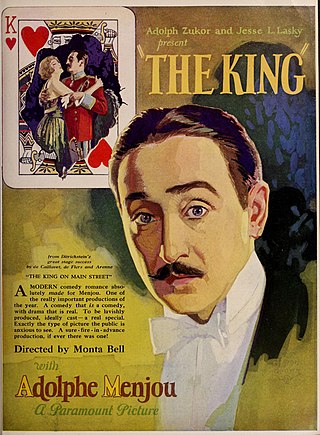
The King on Main Street, also known as The King, is a 1925 American silent romantic comedy film directed by Monta Bell and starring Adolphe Menjou and Bessie Love. The film was adapted for the screen by Bell, and was based on the play The King, Leo Ditrichstein's adaptation of the 1908 French play Le Roi by Gaston Arman de Caillavet, Robert de Flers, and Emmanuel Arène. It was produced by Famous Players–Lasky and distributed by Paramount Pictures.
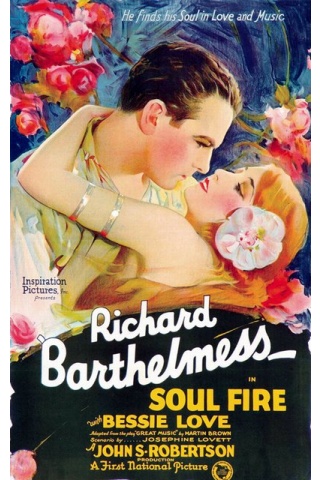
Soul-Fire is a 1925 American silent drama film starring Richard Barthelmess and Bessie Love. It was directed by John S. Robertson and was based on the Broadway production Great Music (1924) by Martin Brown.
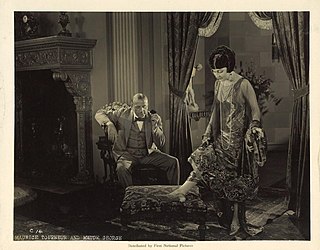
Torment is a 1924 American silent crime drama film produced and directed by Maurice Tourneur and distributed by Associated First National. This film stars Bessie Love, Owen Moore, and Jean Hersholt. The film is based on a story by William Dudley Pelley with script by Fred Myton and titles by Marion Fairfax. It is a lost film.

Cheerful Givers is a 1917 American silent comedy-drama film produced by the Fine Arts Film Company and distributed by Triangle Film Corporation. The film stars Bessie Love and Kenneth Harlan.

Slave of Desire is a 1923 American silent drama film directed by George D. Baker, produced and distributed by Goldwyn Pictures. It was based on the novel La Peau de chagrin by Honoré de Balzac, first published in 1831. The Balzac novel had previously been filmed in 1909 as The Wild Ass's Skin, which was more faithful to the original novel.

Tongues of Flame is a 1924 American silent melodrama film produced by Famous Players–Lasky and distributed through Paramount Pictures. It is based on a novel by Peter Clark MacFarlane and was directed by Joseph Henabery. The film starred Thomas Meighan and Bessie Love. It was produced by Famous Players–Lasky and distributed by Paramount Pictures.
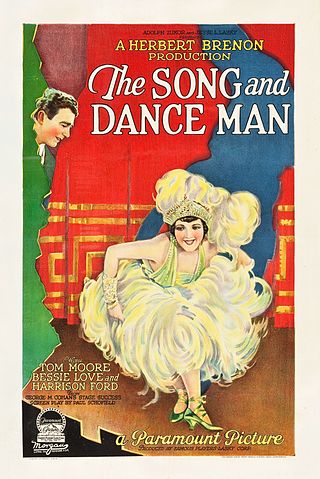
The Song and Dance Man is a 1926 American silent comedy drama film produced by Famous Players–Lasky and released through Paramount Pictures. It is based on a play by George M. Cohan and was directed by Herbert Brenon. A copy of the film is housed in the Library of Congress collection. Of its original seven reels, only the final five survive.

Gentle Julia is a 1923 American silent romantic drama film based on the popular novel Gentle Julia by Booth Tarkington. Directed by Rowland V. Lee, the film starred Bessie Love. It was produced and distributed by Fox Film Corporation, and is considered a lost film.
A Harp in Hock, also known as The Samaritan, is a lost 1927 American silent melodrama film directed by Renaud Hoffman, produced by DeMille Pictures, and distributed by Pathé Exchange. The film starred Rudolph Schildkraut, Junior Coghlan, May Robson, and Bessie Love, and was based on the short story by Evelyn Campbell.

A Sister of Six is a 1916 American silent Western film produced by the Fine Arts Film Company and distributed by Triangle Film Corporation. The film was directed by brothers Chester M. and Sidney Franklin. This was Bessie Love's first starring role.
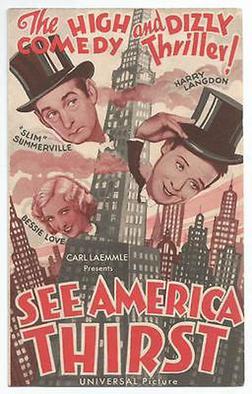
See America Thirst is a 1930 American pre-Code comedy film produced and distributed by Universal Pictures and directed by William James Craft. Silent comics Harry Langdon and Slim Summerville star along with Bessie Love. Though released late in 1930, it nevertheless had a silent version.
Seven Faces is a 1929 American pre-Code drama film with fantasy elements that was released by Fox Film Corporation in the Fox Movietone sound-on-film system on December 1, 1929. Based upon the piece of short fiction "A Friend of Napoleon" which was published in the June 30, 1923, issue of The Saturday Evening Post magazine by popular writer Richard Connell, it was directed by Berthold Viertel and stars Paul Muni in his second screen appearance. Seven Faces is a lost film, with no excerpts from its footage known to exist.

My Official Wife is a 1926 American silent romantic drama film by Austrian director Paul L. Stein, and his first American film. It stars Irene Rich and Conway Tearle. It is an adaptation of the 1891 novel My Official Wife by Richard Henry Savage, but the storyline was updated to include World War I.
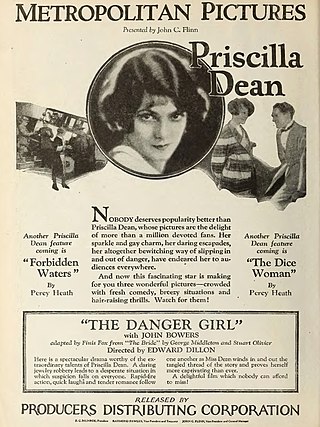
The Danger Girl is a 1926 American silent drama film directed by Edward Dillon and starring Priscilla Dean, John Bowers, and Gustav von Seyffertitz.
Birds of Prey is a 1927 American silent drama film directed by William James Craft and starring Priscilla Dean, Hugh Allan and Gustav von Seyffertitz.
















